Which Style of T-shirt Quilt Is Best for You? Lots of Choices!
Updated: July 15th, 2024 | Published: August 28th, 2023
6 min. read
By Andrea Funk
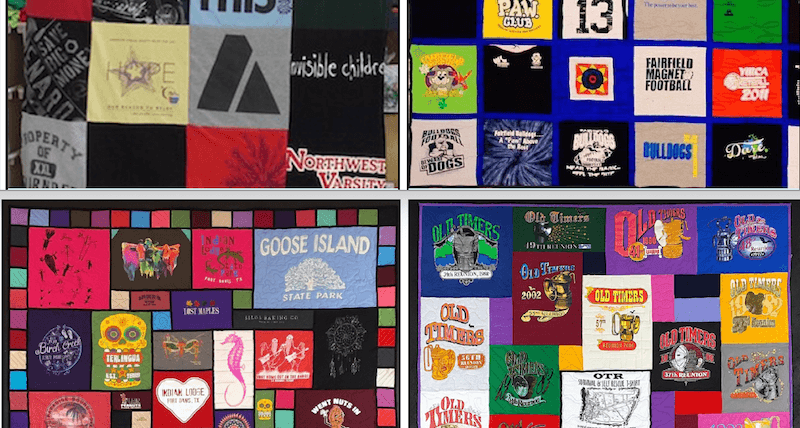
15 Styles of T-shirt Quilts:
- Traditional Block Style With Sashing
- Traditional Block Style Without Sashing
- Unequal Rows or Columns
- The Too Cool Style AKA: Variable or Puzzle Styles
- The Stained Glass Puzzle Style
- 9 Ultra Modern Styles
- Crazy Quilt Style
Are you searching for the perfect style of T-shirt quilt? With so many options to choose from, it can be overwhelming to decide which one is best for you. Each style has its own unique look and feel, as well as its own set of challenges.
Let's explore the various types of T-shirt quilts together. You can either click on each style or continue reading from top to bottom to discover the one catches your eye.
Traditional Block Style With Sashing
Traditional Block Style Without Sashing
Unequal Rows or Columns
The Too Cool Style AKA: Variable Style
The Stained Glass Too Cool or Puzzle Style
Ultra Modern Style T-shirt Quilt
Crazy Quilt Style
Traditional Block Style With Sashing
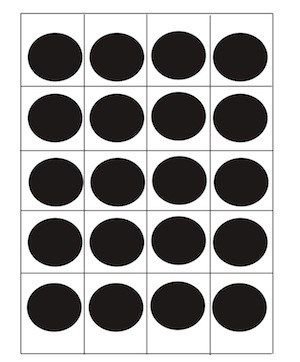 What: This was the first style of T-shirt quilt made. All the blocks were cut the same size. Interfacing was applied to the back of the T-shirt block to make it stiff and easy to work with. The blocks are laid out in columns and rows divided by cotton fabric.
What: This was the first style of T-shirt quilt made. All the blocks were cut the same size. Interfacing was applied to the back of the T-shirt block to make it stiff and easy to work with. The blocks are laid out in columns and rows divided by cotton fabric.
Look: This style of quilt is very simplistic because it is laid out in a checkerboard pattern. When you look at it, your brain easily recognizes the pattern, and you go on. There is nothing there to grab your attention and keep you looking at the quilt. The style is very regimented.
Feel: Stiff! The iron-on backing that is applied to the backs of the T-shirts, is to stiffen them enough so they can be sewn to cotton fabric. This can make this style of quilt stiff and heavy.
Issues: This style does not take into consideration that T-shirt designs are different sizes. If a design is larger than the block size, the area outside the block gets cut off. If the design is a lot smaller than the block, there will be a lot of blank space around the design.
In the photo here, can you pick out the blocks with too much blank space around a small design?
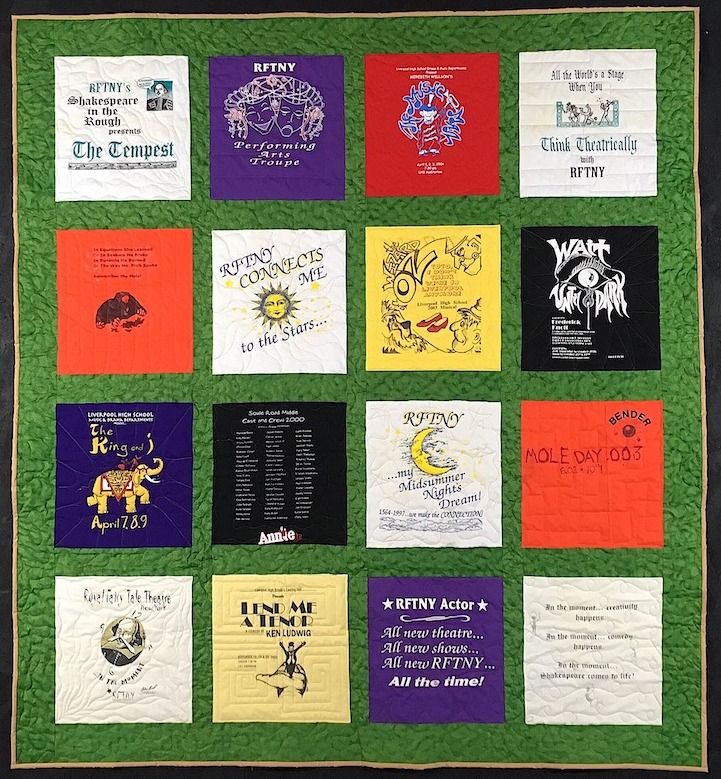
THE PROS AND CONS OF TRADITIONAL STYLE T-SHIRT QUILTS
Traditional Block Style Without Sashing
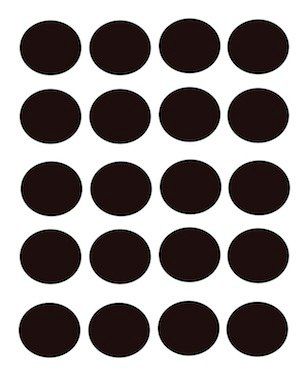 What: This style is the same traditional block style, but it omits the sashing – the fabric dividing the rows and columns. All the blocks are cut the same size and are sewn together in rows and columns.
What: This style is the same traditional block style, but it omits the sashing – the fabric dividing the rows and columns. All the blocks are cut the same size and are sewn together in rows and columns.
Look: Again, this is a very simple style of T-shirt quilt. It’s easy to quickly look at and move on.
Feel: The feel of this quilt will depend on how it is made. If iron on backing is used, it will be stiff. It will be less stiff if the iron on backing is skipped.
Issues: Since this type of quilt is made with just one size block, T-shirts with large designs will have the designs cut off and small designs will have too much black area around them.
In the photo here, can you pick out the blocks where the designs have been cropped off? Look how many blank square they had to put in.
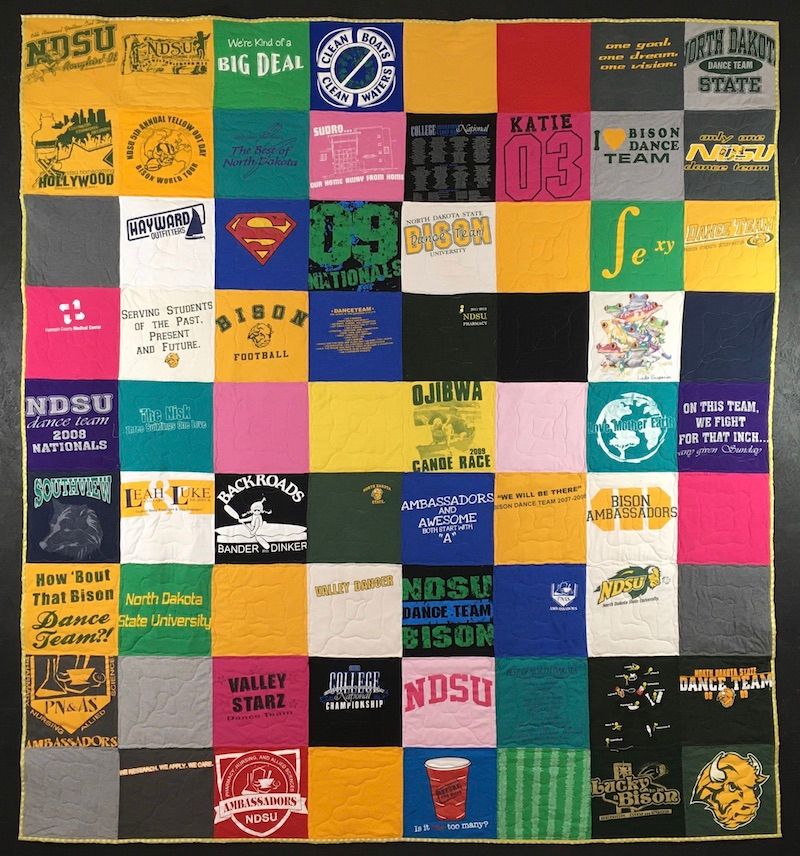
To learn more about T-shirt quilts, visit our Learning Center.
We have over 200 articles about all aspects of T-shirt quilts.
Unequal Rows or Columns
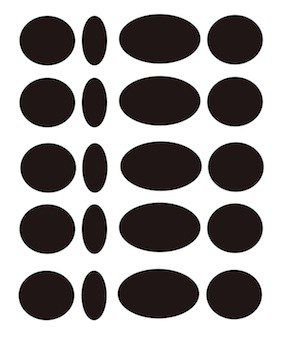 What: Quilters began to recognize that T-shirts have different size designs. To compensate for the size differences, a quilter would choose two or three width of blocks and cut the designs with a width that fits and cut the blocks whatever length is needed. When the blocks are sewn together, they are sewn in columns of matching widths.
What: Quilters began to recognize that T-shirts have different size designs. To compensate for the size differences, a quilter would choose two or three width of blocks and cut the designs with a width that fits and cut the blocks whatever length is needed. When the blocks are sewn together, they are sewn in columns of matching widths.
You would have a wide column, then a narrow column and then a wide column and so on. This style also could be made with same height rows.
Look: This will make for a more interesting quilt than a traditional block style, but the quilt is still made with columns or rows. Your brain still can quickly pick up on the rows or columns and thus it will not hold your interest for very long.
Feel: This will depend on the quilt maker’s decision to iron-on backing or not. If they choose to use iron-on backing to make their job easier, then the quilt will be stiff. Read more about iron-on backing and interfacing here.
Issues: If the design on a T-shirt is still wider than their largest block width, the design will still be cut off.
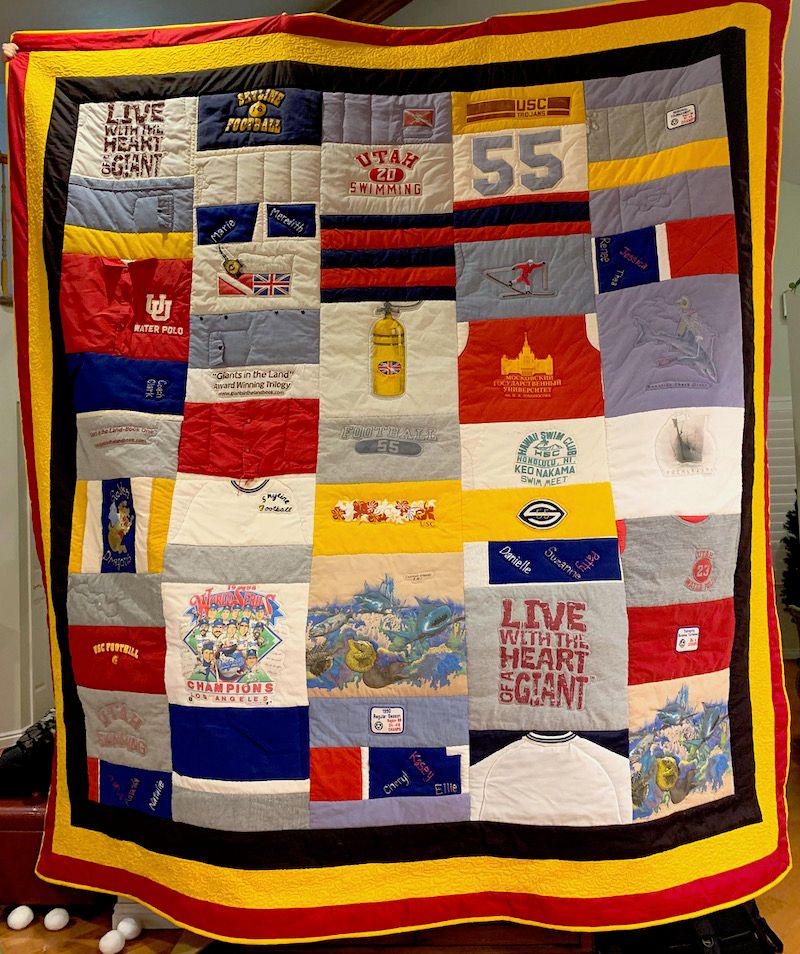
The Too Cool Style AKA: Variable or Puzzle Style
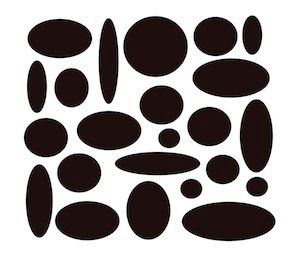 What: This style of T-shirt quilt was created by Too Cool T-shirt Quilts founder, Andrea Funk, in the early 1990’s. All the blocks are different sizes. The blocks are puzzled together so that there are neither columns nor rows.
What: This style of T-shirt quilt was created by Too Cool T-shirt Quilts founder, Andrea Funk, in the early 1990’s. All the blocks are different sizes. The blocks are puzzled together so that there are neither columns nor rows.
Since Too Cool T-shirt Quilts is trademarked, other companies making this style of quilts must call this style something else. Most will use the term variable or puzzle style.
Look: Awesome! None of the designs are cut off or left hanging with too much blank T-shirt around them. The puzzle style also makes you work to figure out the pattern. Since the design is random, you end up spending more time looking at and appreciating the quilt.
Feel: This style of T-shirt quilt should be made without iron-on backing – so it should be soft. Beware, there are some quilt makers too scared to make this or any T-shirt quilt without iron-on backing.
Issues: Because this type of quilt is difficult to make, an inexperienced quilter can make a mess of it! For example, the layout might be simplified into columns and rows because it is tough to puzzle all the blocks together. Another issue an inexperienced sewer may have is sewing the blocks together so they are fit together well. For example, a 4"block might be stretched to 5" or gathered to 3". Either way, it will look wrong.
The Pros and Cons of Variable Size Block T-shirt Quilts
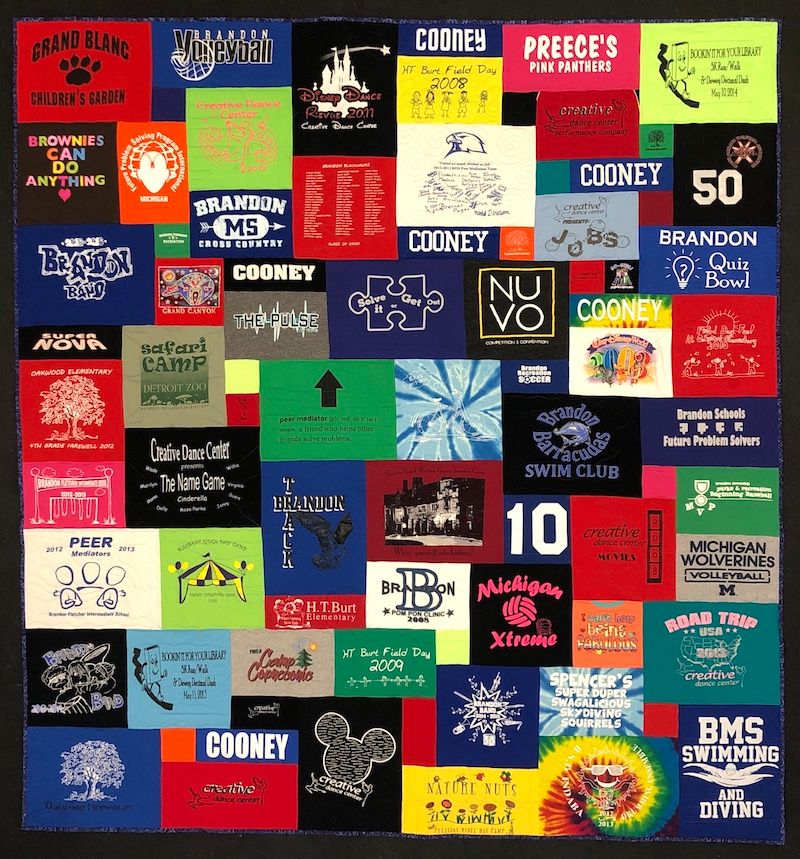
Planning a T-shirt quilt?
Here are step-by-step directions for ordering your Too Cool T-shirt quilt.
The Stained-glass Too Cool or Puzzle Style
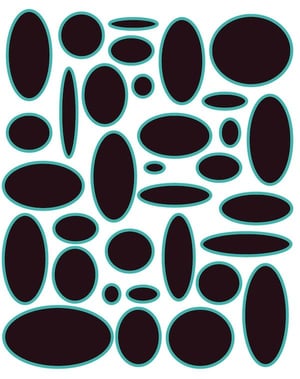 What: This style of T-shirt quilt was created by Too Cool T-shirt Quilts in 2019. It is very similar to our Too Cool style - but with an added kick that is the leading. The leading is a very thin line of color between the blocks. It looks like a stained-glass window.
What: This style of T-shirt quilt was created by Too Cool T-shirt Quilts in 2019. It is very similar to our Too Cool style - but with an added kick that is the leading. The leading is a very thin line of color between the blocks. It looks like a stained-glass window.
All the blocks are different sizes, and the blocks are puzzled together so that there are neither columns nor rows. Since Too Cool T-shirt Quilts is trademarked, other companies making this style of quilts must call them something else – most will use the term variable or puzzle.
Look: Awesome! None of the designs are cut off or left hanging with too much blank T-shirt around them. The puzzle style also makes you work to figure out the pattern. But since the design is random, you end up spending time looking at and appreciating the quilt.
The unique feature of this quilt is the "leading" that surrounds the blocks. This is used to mimic the look of "Lead Came" from the world of stained-glass. The result is a quilt with the feel of a stained-glass window.
Feel: This style of T-shirt quilt should be made without iron-on backing – so it should be soft.
Issues: This type of quilt is very, very difficult to make. An inexperienced quilter will make a mess of it! For example, the layout might be simplified into columns and rows because it is tough to puzzle all the blocks together. Another issue an inexperienced sewer may have is sewing the blocks together so they are fit together well. For example, a 4" block might be stretched to 5" or gathered to 3". Either way, it will look wrong.
And the leading will add a whole other level of complexity to the project. It's a project for a professional who has made 1000's of T-shirt quilts.
Most quilters will also cheat and use iron on backing to make the T-shirt stiff and easier to work with. A quilter making this style of quilt needs to be very experienced.
Read more about Stained Glass T-shirt quilts here.
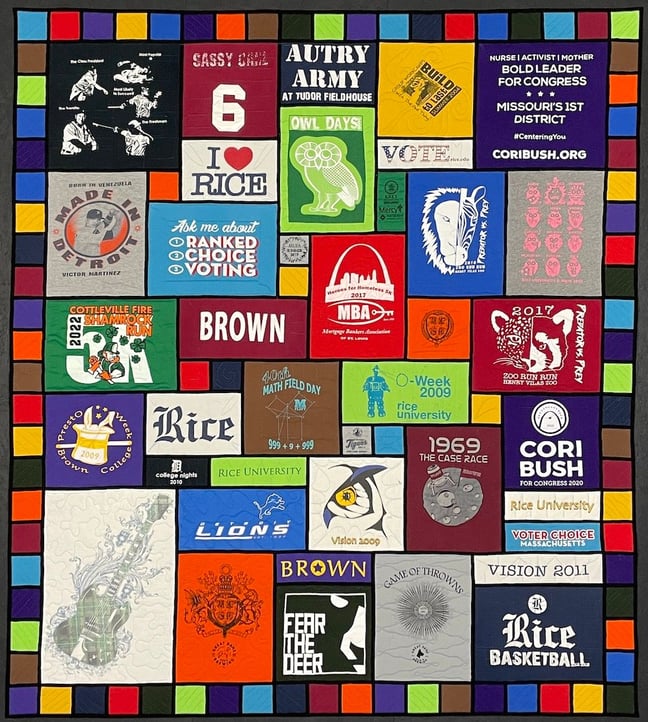
8 Ultra Modern Style T-shirt Quilts
What: 6 new styles of T-shirt quilts that reimagine what a T-shirt Quilt can look like.
Look: Fantastic! These look like nothing you have seen before.
Feel: Ultra Modern Style T-shirt quilts are made without iron-on backing – so they are soft.
Issues: These styles are not for every collection of T-shirts. Each Ultra Modern style has it's own requirements for what type of T-shirt collection would work best.
Here is more information about Ultra Modern T-shirt Quilts.
|
|

Broken Glass StyleArch StyleBroken-glass Style |
|
Kaleidoscope Style |
Squiggle Style |

Bullseye Style |

Flare Style |

Square Spiral Style |

Twisting Spiral Style |
|
Spiral Style |
What's Next? |
Crazy Quilt Style T-shirt Quilt
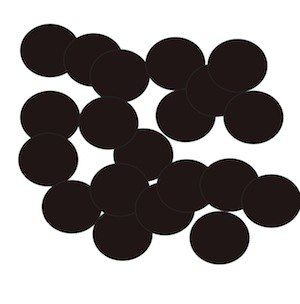 What: All the designs on the T-shirts are cut out willy-nilly. The blocks are then glued to one piece of fabric or bed sheet. The blocks are then zigzagged down.
What: All the designs on the T-shirts are cut out willy-nilly. The blocks are then glued to one piece of fabric or bed sheet. The blocks are then zigzagged down.
Look: This will make for an interesting quilt that will hold your attention and make you spend some time looking at the quilt.
Feel: This type of quilt will be heavier due to the added layer of the sheet or fabric. It also might be stiffer depending on what type of glue is used.
Issues: A possible issue is that part of a T-shirt design may be covered up with another design. If this type of quilt is made by an inexperienced sewer or with a machine with poor tension, the durability of the sewn down pieces of T-shirt material might become an issue.
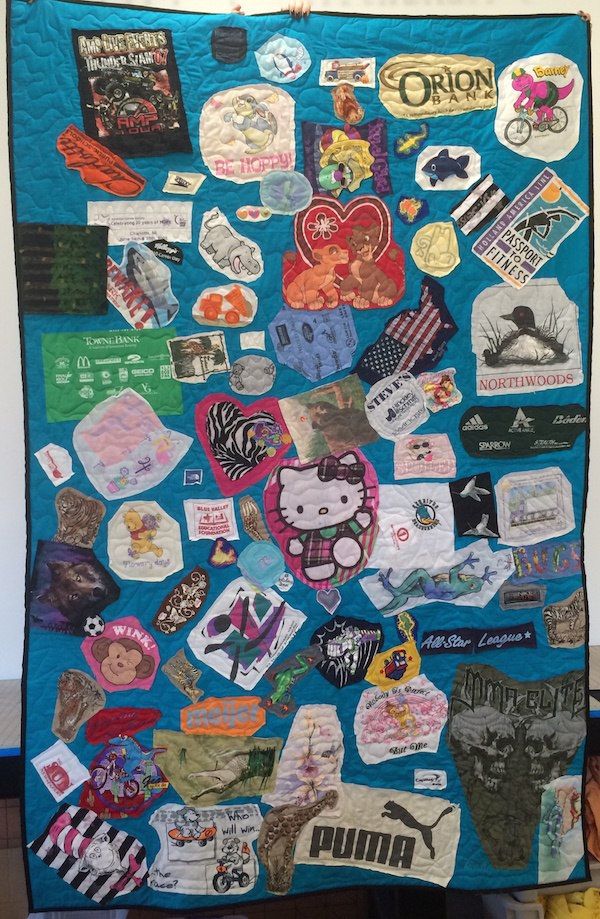
Conclusion
There are so many styles of T-shirt quilts. Each has its advantages and disadvantage. Which style do you like best? Once you know that, you can begin figuring out who can transform your T-shirts into a quilt.
Want to learn more about T-shirt quilts? Visit our Learning Center.
We have over 200 articles about all aspects of T-shirt quilts.
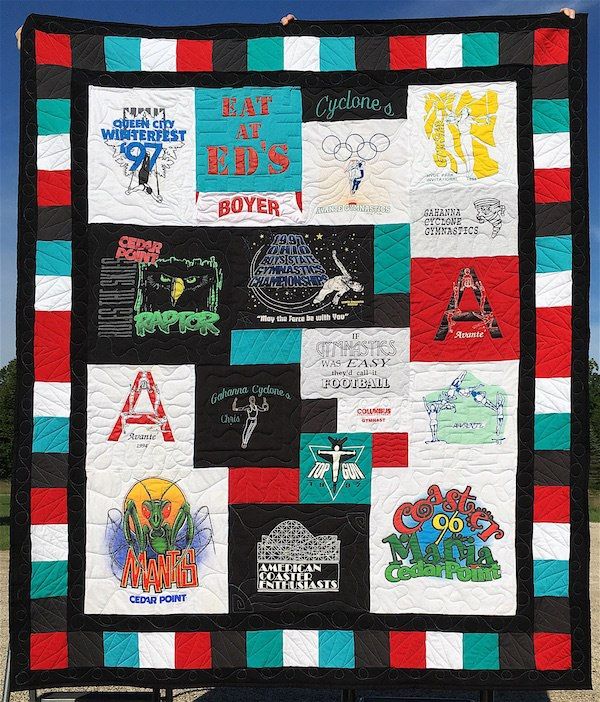
In 1992, Andrea Funk set out to reinvent the T-shirt quilt—and did. She pioneered the use of multi-size blocks and went on to develop six additional quilt styles, establishing Too Cool T-shirt Quilts as the creative engine behind the modern T-shirt quilt movement.




